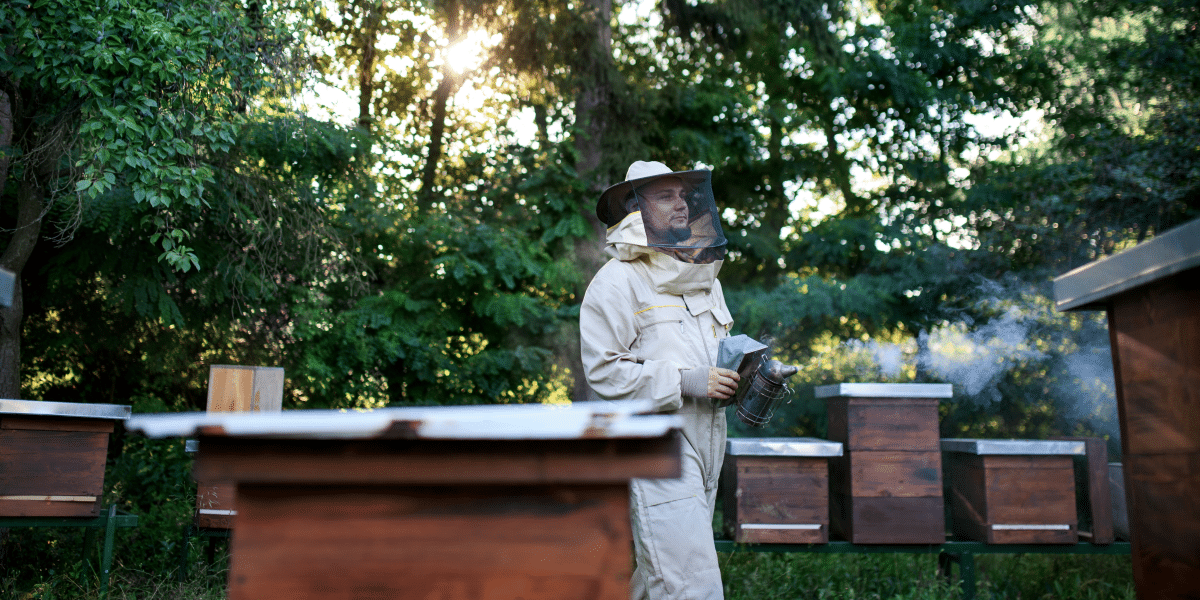When people think of beekeeping, they often imagine rural farms or sprawling countryside gardens. But in recent years, beekeeping has taken a surprising turn as cities worldwide embrace honey bees and establish urban hives on rooftops, balconies, and community gardens. This trend, known as urban beekeeping, has increased as cities work to support bee populations, promote sustainability, and enhance biodiversity.
Why Are Bees Important to City Ecosystems?
Bees are crucial to ecosystems because they play a significant role in pollination, which supports the growth of fruits, vegetables, and other plants. In urban areas, bees pollinate city parks, gardens, and rooftop farms, helping to sustain the greenery that makes cities more livable and eco-friendly. The urban food ecosystem would thrive with bees, affecting the diversity of plants that can grow and the quality of food available.
Urban beekeeping also contributes to environmental health by supporting biodiversity. Bees help pollinate native plants that attract other insects, birds, and small animals, creating a thriving ecosystem in the city. As cities become greener, bees play an important part in promoting biodiversity and making urban areas more resilient against environmental challenges.
The Benefits of Urban Beekeeping for Cities
The growth of urban beekeeping offers multiple benefits for city environments. For one, beekeeping can promote environmental awareness among city residents, encouraging them to learn about pollinators and sustainable practices. Many urban beekeepers host workshops and community events, allowing people to engage with bees up close and understand their importance to the ecosystem.
Urban hives also provide a unique source of locally produced honey. Unlike rural honey, which is typically derived from one or two types of crops, urban honey is often more diverse in flavor. City bees pollinate a variety of flowers, leading to honey that has unique and complex tastes. This local honey is a delicious product and a symbol of how cities can embrace local, sustainable food production.
How Cities Are Supporting Urban Beekeeping
Cities around the world are adopting policies and programs to support urban beekeeping. In places like Paris, rooftop hives have been a staple for decades, with beekeeping encouraged on top of famous buildings like the Opéra Garnier. In New York City, beekeeping was legalized in 2010, leading to a boom in urban hives across the boroughs. Many other cities now offer grants, training programs, and designated spaces for community hives to help promote urban beekeeping.
Challenges of Beekeeping in Urban Environments
While urban beekeeping has many benefits, it also presents unique challenges. For example, city bees face pollution, limited green spaces, and exposure to pesticides, all of which can affect their health and productivity. Urban beekeepers must carefully monitor hive health and ensure that bees have access to enough food sources, such as flowering plants, to support the hive.
Another challenge is managing hive placement to avoid conflicts with neighbors. In densely populated areas, it’s essential to place hives where they won’t interfere with people’s daily routines. Urban beekeepers are trained to handle these challenges, using strategies to keep bees safe and neighbors comfortable, such as placing hives on rooftops or in quiet, secluded areas.
Starting Your Own Urban Hive
Starting an urban hive can be a rewarding project for those interested in beekeeping. Beginners should research local regulations, as some cities require permits or training courses for new beekeepers. Learning about bee behavior is also essential, as managing a hive requires knowledge of hive dynamics, bee health, and seasonal needs.
Begin with a single hive, which requires only a small amount of space, such as a rooftop or balcony, and equip it with a proper hive box, bee suit, and smoker to safely manage the bees. As you gain experience, you can expand with more hives or join a local beekeeping group to connect with other urban beekeepers who share tips and resources.
The Future of Beekeeping in Urban Spaces
Urban beekeeping is likely to grow as more cities recognize the benefits bees bring to urban environments. With concerns about bee populations declining worldwide, cities are stepping up as unlikely yet effective supporters of bee conservation. Programs that support pollinators enhance urban green spaces and contribute to the global effort to protect biodiversity.
As more city residents become aware of the environmental benefits of urban beekeeping, we may see hives in even more unexpected places—from office buildings to apartment complexes to schools. In the future, cities could play a pivotal role in safeguarding bee populations and promoting sustainable practices for future generations.
Embracing Bees in the Heart of the City
Urban beekeeping has transformed the relationship between cities and nature, proving that there is room for the natural world to thrive even in bustling environments. By supporting bee populations, city dwellers contribute to the health of urban ecosystems, produce local honey, and foster greater awareness of sustainability.
For those willing to explore the world of urban beekeeping, the rewards are plentiful—a buzzing hive, a deeper connection to nature, and the knowledge that even in the city’s heart, we can make a difference for the planet’s pollinators.
Published by: Annie P.








